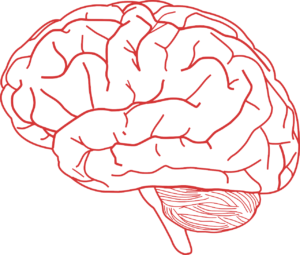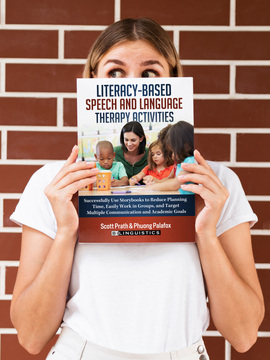Have you ever been in an IEP meeting or sitting with a parent and listened to a diagnostician explain their testing? WOW! They have to write some monster reports. And what diagnosticians and LSSPs (Licensed Specialist in School Psychology) have to do to qualify a child is mind-bending at times. Or maybe you co-wrote a report and were reading back through their explanation of fluid and crystallized intelligence? Mind-bending again.
Today we want to pay special tribute to one of our special education siblings; the infamous, yet illusive diagnostician/LSSP (Licensed Specialist in School Psychology) and how their work relates directly to our students with language impairments.
So sit back and enjoy a quick, down-to-earth explanation about the difference between fluid and crystallized intelligence. Knowing about and the difference between fluid and crystallized intelligence is important to us SLPs for two reasons:
- It gives us the accommodations we need for our reports when a child has both a speech student and also has another disability.
- The distinction shows us how to scaffold our students to produce better narratives and answer questions.
Let’s start with an explanation of crystallized and fluid intelligence.

What is Crystallized Intelligence?
Crystallized Intelligence involves the ability to apply previously learned information to new material. Students with a deficit in this area are likely to have reduced vocabularies and limited background knowledge.
What is Fluid Intelligence?
Fluid intelligence refers to our ability to solve problems by using logic and the information that we have on hand such as recognizing patterns. Students with deficits in fluid intelligence have difficulty taking into account everything that is presented before them and coming to a conclusion.
What Is the Difference Between Fluid and Crystallized Intelligence?
You are probably seeing a lot of your language and pragmatic students in the definitions above. The difference between fluid and crystallized intelligence is easy to recognize in students with language narrative goals. A student with deficits in crystallized intelligence battles with generalizing what he learned in a previous story when he has to tell a similar story on a new topic. A student with deficits in fluid knowledge may see the problem that a main character has, but can’t put together other information from the story to know how to solve it.
Luckily for us, we don’t have to make this distinction through testing. It helps us understand why a language student might be progressing slowly and let us know when we need more support and structure in place.
Recommendations for building vocabulary and background knowledge
- Read regularly, and a discussion about the selection read should immediately follow.
- Develop study guides, vocabulary hand-outs, and presentation outlines for student to access prior to the class discussion.
- Provide direct cues to signify important information, such as informing student during the direct instruction that certain points are important.
- Begin all instruction with advanced organizers. Inform student of the important topics and what she will be expected to learn.
- Assess prior knowledge before introducing new topics/concepts.
- Use techniques that will help student relate new knowledge to her existing knowledge.
- Incorporate student’s interests and knowledge into instructional activities.
- Pre teach vocabulary and new concepts prior to having Student discuss or read material.
- When presenting directions and discussing concepts, use vocabulary that Student understands.
- Provide specific instruction in vocabulary, such as teaching Student common prefixes and suffixes and how they alter word meaning.
Recommendations to assist student in tasks that require the formation and recall of associations:
- Sequence materials from simple to more complex.
- Provide intensive review, repetition, and over-learning at each step of a task.
- Provide frequent opportunities for practice and review. Provide systematic review within a few hours of learning and review previous information in each session.
- Integrate prior knowledge with new knowledge whenever possible.
- Provide student with mnemonic aids or strategies for retention- for example, saying the information to be remembered while looking at it.
- Provide multisensory learning. Involve visual, kinesthetic, vocal, and auditory channels when appropriate-for example have Student repeat step by step directions while she performs the task.
- Provide immediate feedback.
- Provide Student with a list of steps/visuals that will help organize behavior and subsequently facilitate recall.
You can imagine that testing for fluid and crystallized intelligence can be quite a task. It not only explains the 20+page LSSP reports but also why they have to head in so many academic directions to be able to correctly describe a child’s learning ability.
Learning about fluid and crystallized intelligence helped me understand the diag’s testing and has made me more respectfully patient when I am co-writing an evaluation.
While fluid and crystallized intelligence don’t apply to an SLP’s job directly, I wanted to highlight the relationship between the academic focuses and language development. It helped me understand why we share so many language kids with special education and also helped me understand why so many kids are referred for speech and LD testing at the same time.
Let’s end here with a quick lap through the academic areas and how they relate to expressive and receptive language.
Links to Achievement in Reading and Math:
Crystallized intelligence, especially one’s language development, vocabulary knowledge, and the ability to listen are important for reading. This ability is related to reading comprehension in particular. Low crystallized intelligence may hamper an individual’s ability to comprehend written text due to lack of vocabulary knowledge, basic concepts, and general life experiences that are needed to understand the text.
Crystallized intelligence, including language development, vocabulary knowledge and listening abilities are important to math achievement at all ages. These abilities become increasingly more important with age. Low crystallized intelligence may hamper an individual’s ability to comprehend word problems due to lack of vocabulary knowledge. They may hamper one’s ability to learn basic math processes, such as long division, due to impairments in one’s ability to listen and follow sequential directions.
Links to Achievement in Written Expression/Oral Language:
Crystallized intelligence, such as language development, vocabulary knowledge, and general information are important to writing achievement after age 7. These abilities become increasingly more important with age as students are required to draw upon previously learned vocabulary and experiences to generate compositions. Crystallized intelligence, especially one’s language development, vocabulary knowledge, and the ability to listen are important for both listening comprehension and oral expression. Low crystallized intelligence may hamper an individual’s ability to comprehend oral communication due to lack of vocabulary knowledge, basic concepts, and general life experiences that are needed to understand the information being presented.
Long Term Retrieval involves the ability to store and retrieve symbol names over a period of time, holding the information in memory while attending to new information. Students with a deficit in this area may have difficulty such as learning the names of the letters of the alphabet or memorization of math facts.
Links to Achievement in Reading and Math:
Long Term Retrieval abilities are particularly important for reading. For example, elementary school children who have difficulty naming objects or categories of objects rapidly may have difficulty in reading. Associative memory abilities also play a role in reading achievement. Long Term Retrieval abilities are important to math calculation skills. For example, students with deficits in long term retrieval may have difficulty with basic addition, subtraction, multiplication, and/or division facts when encountered within a math problem.
Links to Achievement in Written Expression:
Long Term Retrieval abilities and naming facility in particular have demonstrated relations with written expression, primarily the fluency aspect of writing.
Short Term Memory is the ability to apprehend and hold information in immediate awareness and then use it within a few seconds. Working memory, a subcomponent of short term memory, includes the ability to attend to and immediately recall temporally ordered elements in corrected order after a single presentation, as well as, the ability to store temporarily and perform a set of cognitive operations on information that requires divided attention.
Links to Achievement in Reading and Math:
Short Term Memory is important to reading achievement. Reading comprehension, involving long reading passages, may be affected by skills specifically related to working memory. Basic word reading may be impacted by deficits in short term memory because it may interfere with acquiring letter and word identification skills. Short Term Memory is important to math computation skills. For example, deficits in short term memory may impact one’s ability to remember a sequence of orally presented steps required to solve long math problems.
Links to Achievement in Written Expression/Oral Language:
Memory span is especially important to spelling skills, where working memory has shown relations with advanced writing skills. A student with short term memory deficits may have problems following oral directions because they are unable to retain the information long enough to be acted upon. A student with short term memory deficits may have problems with oral expression because of difficulties with word ‐find or being able to retain information long enough to verbally express it.
Resources:
Download to share with staff: Crystalized Knowledge/Intelligence as it relates to a Learning Disability






This article makes possible integration of significant information from the psychological evaluation and language evaluation results. This translates into very targeted goals for student success with rewarding results.
Glad you liked it and thanks for you comment.